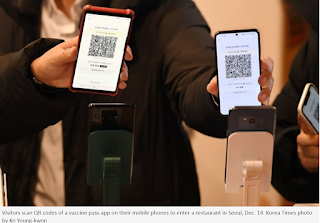A column contributed by Vincent Koen of the OECD provides a valuable sketch of Korea's economic progress since it joined the OECD in 1996. (click on the graphic for a full size version) Particularly notable, as illustrated, is that Korea's GDP per capita surpassed that of Japan in 2020. As reported by The Korea Times, the column notes that "The so-called "Miracle on the Han River" had transformed one of the world's poorest countries at the end of the 1950-53 Korean War into an economy where per-capita income matched that of some European countries. Nevertheless, it was still far below the OECD average in 1996. Over the past 25 years, Korea has carried out major economic reforms, aligned its policies on OECD best practices in many areas, increased its integration into the global economy and further enhanced its technological and human potential. GDP per capita converged to the OECD average and overtook Japan's, and Korea became the world's 10th-largest economy."






























